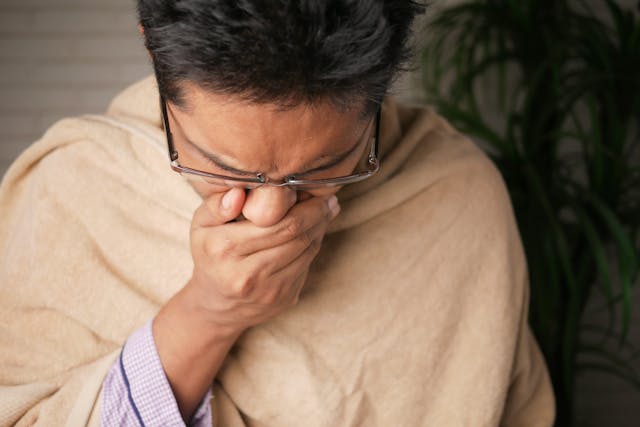Key takeaways
- Withdrawal Symptoms Are Uncomfortable But Temporary
- Timely Treatment and Support Ensure Success
- Nicotine's Impact Lingers, but Not Forever
- Coping Strategies: Support, Routine, and Motivation
When it comes to quitting smoking, we know that the benefits outweigh the cons. However, if you’ve attempted to quit in the past, you’ll know that withdrawal symptoms can be overwhelming enough to lead to a relapse.
Withdrawals are unpleasant and sometimes feels too painful to bear. However, these are all feelings — these symptoms cannot hurt you. Maintaining focus and having a solid support network is the key to overcoming it.
Below, we explain why you might feel worse after quitting smoking, as well as what you can do to alleviate some of these side effects.
Why Do I Feel Sick After Quitting Smoking?
When you smoke, you receive consistent hits of nicotine in the body. Your brain has made space for nicotine in your body, which means if this is taken away, you’ll feel massive changes in your body which can manifest into insomnia, fatigue or withdrawal.
Chat to a prescriber
Bulk-billed phone consultations
TGA-authorised clinicians
Nicotine vaping scripts available
Take a moment to consider: how do I usually feel in between cigarettes? Your answer is likely to include words like restless, anxious, and irritable.
In one study conducted by researchers, smoker who abruptly stop smoking might feel severe withdrawal symptoms such as having difficulty sleeping and higher levels of stress.
These symptoms in between each cigarette are actually signs of nicotine withdrawal. They’re also the reason you’ll then reach for your next cigarette.
Consider how it feels when you stop smoking for a while. You’re back from a break and have started working on your task. Then, you feel unable to concentrate or disoriented within a few hours until you can consume another cigarette.
With withdrawal symptoms, you take this to a higher level — you’re quitting smoking after all.
Fortunately, those uncomfortable symptoms start to fade as you smoke, and you feel settled again. Then, the cycle repeats. This is basically nicotine addiction in action, and it’s these very symptoms that make quitting is so challenging.
Physical Withdrawal Symptoms From Quitting Smoking

Depending on your level of nicotine dependency, you may experience one or more of the following physical withdrawal symptoms.
Insomnia Or Fatigue
Withdrawal from nicotine can cause sleep disturbances.
Expect that you’ll be thinking about more things and finding it harder to sleep than usual, especially during your first week of stopping smoking. But, these feelings, alongside being more lethargic and tired all the time, will all subside over time.
Restlessness Or Struggling To Focus
Feeling restless, jumpy, and a bit foggy after quitting smoking is common. Nicotine has played the primary role of centering and relaxing you during times of stress. This is the reason why you feel these symptoms and even irritable in hectic situations.
Once your body adapts to zero nicotine in a few weeks, you’ll find these symptoms and fogginess disappear over time.
Gastrointestinal Discomfort
Feeling a little gassy and abdominally uncomfortable during your quitting phase? Don’t fret, this is normal. Quitting smoking increases the rate of your digestion, which is why some people experience constipation after quitting smoking.
Most people only experience bouts of constipation over 1-2 weeks, after which symptoms resolve.
Emotional Withdrawal Symptoms From Quitting Smoking
In addition to physical symptoms, withdrawal can cause some psychological symptoms.
Cravings
Nicotine is an addictive substance that promotes the release of dopamine in the brain, which is the chemical responsible for pleasure.
When you quit smoking, your brain registers that it’s no longer receiving dopamine and will signal to you that it wants more. This results in cravings.
As with all withdrawal symptoms, cravings will be strongest in the first few days after quitting. Cravings usually come in waves and last about 10 to 20 minutes before passing.
This explains why you have strong withdrawal symptoms, feel tired, or are usually irritable or experience brain fog during your first few weeks of stopping smoking.
Fortunately, cravings will decrease in intensity and frequency over a 2-4 week period before disappearing entirely.
Feeling Angry And Frustrated
Research has shown that when quitting smoking, it’s common to feel angry, irritable, and frustrated.
Nicotine and the hit of pleasure has been the best way to mask some sensations you’ve never experienced before. This explains why some things that never bothered you feel more intense and problematic than ever.
But the good news is, again, it only lasts for a few weeks. Studies have shown that over time, your body gets used to coping from stress without the need for nicotine.
By the time you reach this point, only the habit of smoking will be the main problem in keeping you off of cigarettes for good.
If you think that anyone around you or at work might feel bothered or concerned about it, let them know about your intention to quit smoking and the withdrawal symptoms you might experience.
Feeling Anxious Or Depressed
It’s okay to feel anxious and depressed, and more so to feel this way once you’ve quit smoking and nicotine for good. Without dopamine from nicotine, the body looks for other ways or tries to vent out its imbalance in various ways.
For people who smoke and have previous mental or emotional conditions, it’s wise to seek help from a GP to support yourself throughout your quitting journey.
For many people, smoking is used as a coping mechanism for anxiety. However, smoking only momentarily alleviates the discomfort that comes with nicotine withdrawal.
As mentioned earlier, smoking and nicotine can mask various sensations and feelings that you never noticed quite easily until you’ve started to remove it from your life. What might feel like an antidote for anxiety is actually just covering up the emotional and psychological issues you might actually be experiencing.
If you are experiencing mental health difficulties while quitting smoking, it’s important to discuss this with a GP who can recommend counselling and behavioural therapy to help you on your journey.
How To Cope With Withdrawal

Withdrawal is a normal process for any motivated smoker. In fact, whichever negativity or tiredness you feel during this time is typical and should not alarm you or anyone. To help you make matters easier throughout your quit journey, here are a few things that can help:
Seek Support
Whether you seek support from friends and family or a health care professional (ideally, seek the support of both), it’s important to have people around you who are aware that you’re quitting and can help to encourage you along the way.
Your support network can also help when cravings come along by distracting you. It’s a good idea to get in touch with your GP to discuss the option of seeing a counsellor.
GPs can help assess your current condition. Your withdrawals might be strong because you previously smoked more sticks or packs than other motivated smokers before quitting. With the right advice on your quit journey, you may be able to reduce the withdrawal symptoms and give yourself better motivation to quit smoking.
Find A Distraction And Set Up A Routine
Take note of when you would usually smoke, and prepare distractions for those times.
You might want to make a coffee, drink a glass of water, chew on a piece of gum, or call a friend when you anticipate a craving coming on. It can be helpful to write up a daily routine in anticipation of those moments you’d normally have a cigarette.
For example, you might write, ‘after breakfast, have a cup of tea’, then ‘at lunch, go for a walk with a friend.’
Move Your Body
During the day, get some exercise in. Even a light walk will release endorphins to boost your mood, as well as tire out your body to help you settle into sleep.
Even simple exercises like hand-gripping for 10 minutes greatly reduces withdrawal symptoms for 10 minutes, according to one study.
If you can do so, jogging is much more helpful — a tired body after exercising gives you that feeling of achieving something difficult. Once you do it regularly, the body begins to crave the sensation of accomplishing something great with simply jogging.
Implement Calming Activities
To help you cope with any restlessness or anxiety, you can implement a few relaxing activities throughout your day.
You might want to try meditating for 3-5 minutes every night or reading before bed. You might prefer to journal and write out everything you’re feeling, including reminders for why you’re quitting.
These can help keep you motivated and on track. For a list of activities you can do, here’s a list of enjoyable ones you’d probably love.
Avoid Caffeine

Try to cut your caffeine intake down by 50%, if possible. Caffeine is metabolized more quickly in smokers, so you may have needed more caffeine during your time smoking.
Once you’ve quit, it’s important to cut down again to prevent over-stimulation which can result in increased restlessness, anxiety, irritability, and insomnia.
Caffeine in some way also makes cigarettes much more palatable. To avoid this, switch to drinking milk, which makes cigarettes taste much more terrible and is a great way to change your habit.
Take Care To Sleep Well
Fatigue is easily solved by finding sleep. But, how can you sleep if it’s quite hard to do so due to withdrawal symptoms?
It’s not just you. Many smokers find that sleep does not come easily, especially if you’re having strong cravings for a cigarette while you’re lying in bed. If you’re struggling with insomnia, a calming nighttime routine will signal to your body that it’s time for rest.
Switch off devices at least an hour before bed, then you might like to take a warm shower, drink a decaf tea, and do some reading, journaling, or gentle meditation. Ensure your bedroom is dark and set to a comfortable temperature.
We recommend setting a routine that lets you get in as many hours of sleep as you possibly can. Your body also recovers faster when you get enough sleep, and may adapt quicker without nicotine the more you do so.
Consider Nicotine Replacement Therapies
If quitting cold turkey has proved unsuccessful, it’s a good idea to consider nicotine replacement therapies (NRT).
They are extremely effective in helping people abstain from smoking long-term, particularly when used in conjunction with behavioral therapy. For more information on Nicotine Replacement Therapies, head to our dedicated guide here.
For more strategies to help you quit smoking, visit this article.
Second Line Solutions

While NRT is helpful for smoking cessation, it doesn’t work for everyone. Fortunately, there’s another solution that can help – nicotine vaping products (NVPs).
You’ll need a nicotine prescription from your GP before you can purchase NVPs from a pharmacy — the safest option out there. With the new March 2024 legal updates on NVPs, quitting smoking has become much safer for motivated smokers out there.
Here’s the entire process:
Go Through First-Line Solutions First
NRT products (like patches and gums) are the most trusted quitting option available for motivated smokers. They might not imitate cigarettes, but they contain a small dose of nicotine that may be enough to alleviate your withdrawals.
While NRTs can be effective, they don’t work for everyone. If these haven’t done the trick for you, you may now be eligible for a nicotine prescription.
Chat to a GP
As mentioned, NRT products have worked for many successful ex-smokers. But, you might have ingrained behaviours and triggers that only something that mimics a cigarette can successfully address, such as the hand-to-mouth motion, and needing something to use while having a drink with friends.
If your GP deems it necessary, they can write you a nicotine prescription for NVPs.
You can chat to your usual GP about this, or book a friendly phone chat with an authorised prescriber of nicotine.
Visit Your Local Pharmacy
Once you have your nicotine prescription, you can pop down to your local pharmacy. Over 2,200 pharmacies across Australia hold these products in-store, but any pharmacy can order these in for you if they don’t currently stock them.
Both your pharmacist and GP can advise you on how best to use the product, such as the initial setup, and the number of puffs to take when you feel withdrawals.
How Long Does Nicotine Stay In Your System?

Nicotine doesn’t overstay in your system, in fact, it goes away quite quickly, contributing to its naturally addictive nature.
Nicotine quickly enters the bloodstream is broken down by enzymes and turned into cotinine, then removes itself from your body in just an day or two.
Whenever you consume nicotine, your bloodstream rises while smoking and lowers immediately after consuming a stick.
The nicotine levels in your blood will depend on how much nicotine you inhale, as well as how much nicotine is in the cigarette. Your genetic makeup will also determine how much nicotine is absorbed into your bloodstream.
Generally, nicotine can usually be detected in the blood for 1-3 days after your last cigarette. Cotinine can be found in the blood for up to 10 days.
Nicotine and cotinine leave your body as quick as 4 days from your saliva. Between 4 days and 3 weeks after your last cigarette, it will not be present in your urine depending on how many cigarettes you’ve smoked. in the past.
Increased Appetite (Does Smoking Cessation Cause Weight Gain?)
Weight gain after quitting smoking is very common. Studies have shown this to be the case after you quit smoking and nicotine. This happens for three key reasons:
- Nicotine speeds up your metabolism – when you smoke, the number of calories burned at rest increases by 7-15%, as reported by the National Library of Medicine. Once you stop smoking, you may find you burn through calories slower.
- Cigarettes suppress your appetite – nicotine activates a pathway in the brain that suppresses appetite, which can lead to weight loss. When you quit smoking, you will likely feel hungrier.
- You may replace smoking with food – oftentimes, smoking feels like an oral fixation as the mouth and taste is involved. As a result, your body craves food to get this stimulation or even imitate the hand-to-mouth gesture that’s part of your previous oral fixation. You may also like eating much more because food tastes much better now that your tastebuds have fully recovered after smoking.
These changes to your appetite are common and normal. In most cases, provided you’re sticking to a balanced diet and are exercising regularly, weight gain is a sign that your body is returning to health.
In some cases, it can be extremely challenging to avoid eating too much, especially after you’ve quit smoking. The help of a GP’s oversight is invaluable at this stage.
They can recommend activities to help distract you from smoking and eating altogether and make your quitting journey much more pleasant and tolerable.
Nicotine Withdrawal Timeline
Here’s a quick rundown of a typical nicotine withdrawal timeline.
- Nicotine withdrawal will begin 2-3 hours after your last cigarette.
- Withdrawal symptoms are usually strongest 1-4 days after quitting and can last for 2-4 weeks, reducing in intensity during this period.
- After about a month, the withdrawal symptoms will dissipate completely for most people.
- It should be noted that while physical withdrawal symptoms will resolve for most people at this point, psychological symptoms may continue.
Some people experience mild withdrawal symptoms while others may experience more intense sensations.
Generally, people quitting cold turkey will experience worse withdrawal symptoms than those with a dedicated treatment plan that combines counseling, behavioural therapy, and Nicotine Replacement Therapy (NRT).
What Happens When You Completely Quit Smoking?

Setting your goals is the best way to quit smoking for good. Fortunately, many motivated smokers experience great relief after they just stick with their quit-smoking journey within just a few months. Below, we take a look at a timeline of what happens when you quit smoking:
Within 20 Minutes
Your blood pressure and pulse return to healthy, normal levels. The fibers that help to keep bacteria out of your lungs will start to move again after being restricted due to smoking.
8 Hours
The carbon monoxide levels in your body will return to normal. This will help promote blood flow and tissue recovery.
1 Day
The oxygen in the body increases and the veins and arteries expand back to healthy levels. These changes are vital to prevent heart disease.
The damaged nerve endings in your body start to regenerate.
3 Days
You will be able to breathe more easily as your lung capacity increases.
Your sense of taste and smell improves. If you have managed to get to the one-week mark, you’re now 9 times more likely to cease smoking completely.
You’ll be able to move and breathe more easily as circulation and oxygenation improve.
Your skin appearance will improve, and you will feel more energized. At this point, any remaining breathing difficulties are likely to improve significantly.
In one study, people who used to smoke found their strength and focus improved greatly, especially after performing physical activities.
6 Months
You’ll be much better at handling stress without smoking. At this point, you’ve likely handled a few stressful situations smoke-free, which will give you the confidence to handle any other difficult scenarios in the future.
Your risk of heart disease is now half of what it was when you were smoking.
5 Years
After 5 smoke-free years, your stroke risk is the same as the risk for non-smokers.
10 Years
Your lung cancer risk is now half of what it was when you smoked.
Your heart disease risk is now the same as the risk for non-smokers.
Feel more inspired by looking at the complete timeline to quit smoking and push further on with your motivation to kick the habit.
Summary

It’s easy to feel like you’re dying when you experience nicotine withdrawal upon quitting smoking, but the good news is, it isn’t forever. By just sticking to your quit process and handling your withdrawals with the help of experts, you can be sure everything will feel better and fade over time.
Fortunately, there are great tools to alleviate withdrawals such as NRT and pharmacy NVPs to help you stop smoking for good. Just make sure to get a GP’s guidance on using nicotine withdrawal aids to keep you safe and fully focused on your journey to stop smoking.
Smokefree Clinic gives you access to many medically reviewed and trustworthy resources that can inform and aid you in your path to wellness, so have a look around!
If you’re ready to get started, Smokefree can connect you to friendly Australian healthcare professionals who excel in helping patients quit smoking for good, including via the use of pharmacy NVPs.
Click here to book in with a doctor today.
Resources and Links:
- https://jiaap.in/wp-content/uploads/2024/03/34-Swetha-298-305.pdf
- https://pubmed.ncbi.nlm.nih.gov/17365764/
- https://www.ncbi.nlm.nih.gov/pmc/articles/PMC11118784/
- https://journals.plos.org/plosone/article?id=10.1371/journal.pone.0299702
- https://www.tga.gov.au/news/media-releases/new-regulation-vapes-starting-january-2024
- https://www.nature.com/articles/s41440-023-01549-8
- https://medlineplus.gov/ency/patientinstructions/000811.htm
- https://www.tandfonline.com/doi/full/10.1080/15502783.2024.2302383
- https://www.pnas.org/doi/full/10.1073/pnas.0702698104

